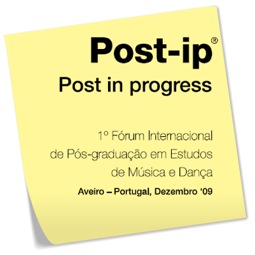A JAM SESSION ENQUANTO OBJECTO DE ESTUDO
Resumo
Este trabalho discute os principais estudos realizados em torno da jam session, focando as várias formas como esta prática performativa tem sido abordada na literatura sobre jazz. Partindo da pesquisa bibliográfica realizada no Institute of Jazz Studies na Rutgers University (E.U.A.), e de trabalho de terreno levado a cabo entre 2004 e 2005 em clubes de jazz em Manhattan, analiso até que ponto estes estudos reflectem perspectivas pobres e descontextualizadas sobre uma prática performativa crucial no desenvolvimento do processo criativo, aprendizagem e construção de redes profissionais de músicos de jazz.
Os escassos estudos existentes sobre a jam session, apesar de contribuírem para o levantamento de algumas questões importantes, são insuficientes para um profundo conhecimento desta prática nas suas vertentes musical, social e cultural, nomeadamente em termos do seu funcionamento e papel no âmbito do jazz. O discurso e pontos de vista dos músicos são negligenciados na grande maioria dos trabalhos realizados.
Referências
Cameron, William Bruce. 1954. “Sociological Notes on the Jam Session”. Social Forces 33: 177-182.
Daniels, Douglas Henry. 1985. “Lester Young: Master of Jive”. American Music 3: 313-28.
Davis, Miles.1990. With Quincy Troupe. Miles: The Autobiography. New York: Touchtone. Orig. Pub. New York: Simon e Schuster.
DeVeaux, Scott.1997. The Birth of Bebop: A Social and Musical History. University of California Press, Berkeley.
Ellison, Ralph. 1953. Shadow and Act. Vintage Books: New York.
Esman, Aaron H. 1951. “Jazz-A Study in Cultural Conflect”. American Imago VIII (June): 219-226.
Gioia, Ted. 1989. “Jazz and the Primitivist Myth”. Musical Quarterly 73:1: 130.
Lippincott, Bruce. 1958. “Aspects of the Jam Session”. In Jam Session: An Anthology of Jazz. Ed. Ralph Gleason. The Jazz Book Club. London.
Merriam, Allan P., and Raymond W. Mack. 1960. “The Jazz Community”. Social Forces 38 no. 3 (Março): 211-22.
Nelson, Lawrence D. 1995. “The Social Construction of the Jam Session”. Jazz Research Papers (IAJE) 1995: 95-100.
Patrick, James. 1983. “Al Tinney, Monroe´s Uptown House, and the Emergence of Modern Jazz in Harlem”. Annual Review of Jazz Studies 2: 151-179.
Peterson, Joseph M. 2000. “Jam Session: An Exploration Into The Characteristics Of An Uptown Jam Session”. Tese de Mestrado. Rutgers University.
Direitos de Autor (c) 2010 Post-ip: Revista do Fórum Internacional de Estudos em Música e Dança

Este trabalho está licenciado com uma Licença Creative Commons - Atribuição-NãoComercial 4.0 Internacional.





